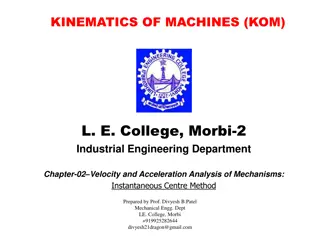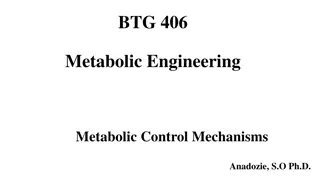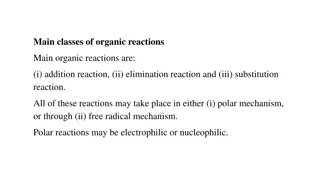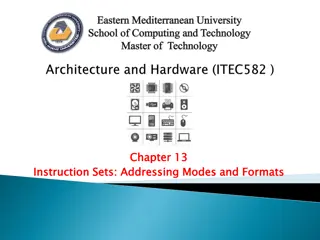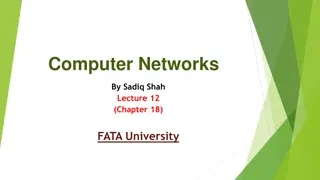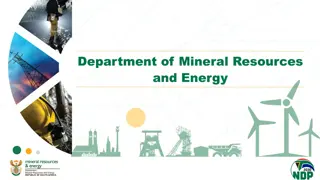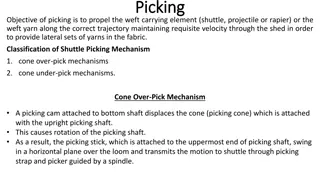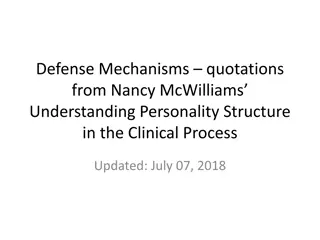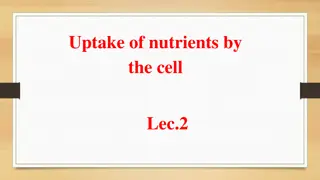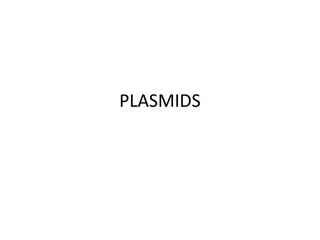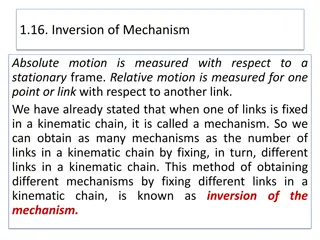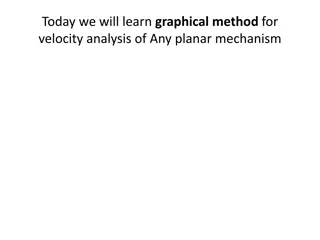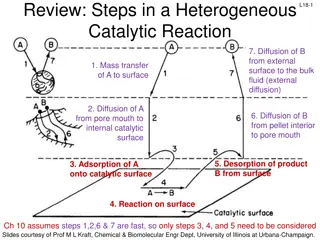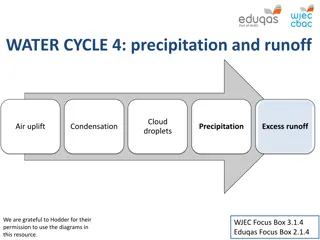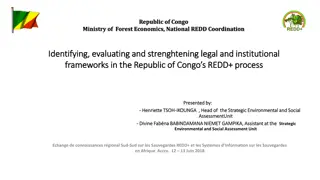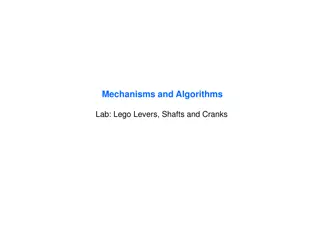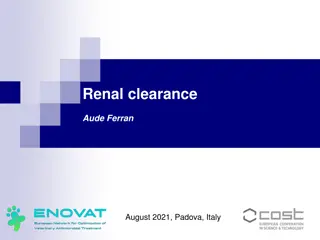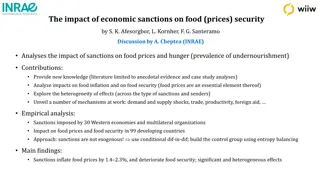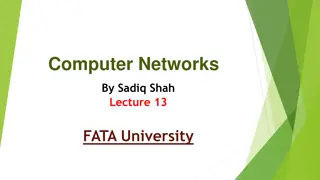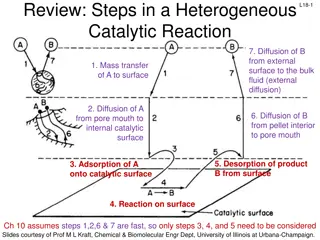Understanding Narcotic Analgesics and Opiates: History, Mechanisms, and Uses
Delve into the world of narcotic analgesics and opiates, exploring the history of opium poppy, morphine derivatives, opioid compounds, and the pharmacology mechanisms of action. Discover the uses of opiates in analgesia, preanesthetic medication, and more, alongside the endogenous ligands involved.
8 views • 55 slides
Advancements in Chemical Mechanisms for Air Quality Management
Daniel Jacob and team have been enhancing chemical mechanisms in the GEOS-Chem model to support US air quality management. Ongoing work includes developing new mechanisms for aromatic VOCs, tropospheric halogens, mercury redox, adaptive mechanism reduction, machine learning applications, and unifica
0 views • 19 slides
Kinematics of Machines: Instantaneous Center Method for Velocity and Acceleration Analysis
Explore the method of locating instantaneous centers in mechanisms to analyze velocity and acceleration. The content covers examples of pin-jointed four-bar mechanisms and slider-crank mechanisms, providing dimensions and angular velocities calculations. Prof. Divyesh B. Patel from L.E. College, Mor
0 views • 13 slides
Understanding Plasmid Partitioning Mechanisms in Bacteria
The stable maintenance of low-copy-number plasmids in bacteria relies on partition mechanisms that ensure proper positioning during cell division. Different from high-copy-number plasmids, which rely on random diffusion, low-copy-number plasmids require regulated partitioning mechanisms to prevent d
0 views • 14 slides
Understanding Metabolic Control Mechanisms in Cellular Regulation
Metabolic control mechanisms play a crucial role in maintaining homeostasis within cells by regulating metabolic pathways. This involves finely adjusting the output of pathways in response to external signals, ensuring the proper flux of metabolites to meet cellular needs. Pacemaker enzymes, such as
1 views • 17 slides
Overview of Organic Reactions and Mechanisms
Organic reactions can be categorized into addition, elimination, and substitution reactions, occurring through either polar or free radical mechanisms. Polar reactions may be electrophilic or nucleophilic, while free radical reactions involve radicals reacting to complete electron octets. Different
2 views • 26 slides
Understanding Prezygotic Reproductive Isolating Mechanisms
Prezygotic reproductive isolating mechanisms prevent mating or fertilization between different species before it can occur. Examples include habitat isolation, behavioral isolation, and temporal isolation. These mechanisms play a significant role in maintaining species integrity and preventing the f
0 views • 4 slides
Addressing Modes and Formats in Instruction Sets
This material discusses addressing modes and formats in instruction sets, covering types of addressing modes, design trade-offs, and the distinction between machine language and assembly language. It explores the need for various addressing techniques to reference locations in memory and presents co
1 views • 58 slides
Understanding IPv4 Addresses and Classful Addressing in Computer Networks
Explore the basics of IPv4 addresses, address space, hierarchy in addressing, and classful addressing in computer networks. Learn about the unique 32-bit structure of IPv4 addresses, address space calculation, notation methods, and the hierarchical nature of network addressing. Dive into the concept
2 views • 14 slides
Fuel Pricing Mechanisms and Regulatory Framework Presentation
This presentation to the Portfolio Committee on Mineral Resources and Energy delves into the Basic Fuel Price (BFP) for liquid fuels, covering global fuel pricing forms, policy positions, key pricing mechanisms, regulatory mandates, and the intricate structure behind fuel prices. It explains how the
2 views • 28 slides
Understanding Shuttle Picking Mechanisms in Weaving
Shuttle picking mechanisms play a crucial role in propelling the weft carrying element to maintain the required trajectory and velocity in fabric weaving. Two common mechanisms are cone over-pick and cone under-pick, each offering unique adjustments for strength and timing. The cone over-pick involv
0 views • 14 slides
Understanding OSI Model and TCP/IP Protocol Suite in Computer Networking
This chapter explores the OSI model and TCP/IP protocol suite, delving into protocol layers, addressing mechanisms, and network components. It highlights the interface between layers, functions of each layer in the OSI model, and compares TCP/IP protocol suite layers with OSI model layers. The discu
0 views • 30 slides
Exploring Defense Mechanisms in Personality Structure
In "Understanding Personality Structure in the Clinical Process" by Nancy McWilliams, various defense mechanisms are illustrated through real-life examples. These mechanisms include primitive withdrawal, denial, omnipotent control, idealization and devaluation, and projection with projective identif
1 views • 29 slides
Understanding Host Defense Mechanisms Against Infection
Host defense mechanisms safeguard the body from pathogens through various strategies such as intact skin, mucous membranes, nonspecific immune responses like phagocytic cells, and specific immune responses involving antibodies and lymphocytes. Key protective barriers include the skin, eyes, digestiv
3 views • 16 slides
Understanding CBE's Revised IDoW Policy for Regulatory Mechanisms
This presentation by the Council for the Built Environment (CBE) outlines the Identification of Work (IDoW) Policy, elucidating key regulatory mechanisms, acronyms, definitions, and the role of the CBE in implementing and evaluating such mechanisms in the built environment sector. The purpose is to
0 views • 28 slides
Mechanisms of Nutrient Uptake by Microbial Cells
Nutrient uptake by microbial cells involves various transport mechanisms such as passive diffusion, facilitated diffusion, active transport, and group translocation. These mechanisms ensure the specific acquisition of required nutrients by the cell through the selectively permeable plasma membrane.
3 views • 15 slides
Understanding Plasmids: DNA Molecules Free of Chromosome
Plasmids are DNA molecules existing free of the chromosome in a cell. They can be circular or linear and carry genes beneficial to the host. Plasmids replicate from unique origins and regulate copy numbers through various mechanisms. Different replication mechanisms, such as theta and RC, are used,
0 views • 31 slides
Understanding Addressing Modes in 8051 Microcontroller
Addressing modes in the 8051 microcontroller play a crucial role in specifying how data is accessed and operated by instructions. They include register addressing, direct addressing, register indirect addressing, immediate addressing, and indexed addressing modes. Each mode offers unique ways to han
2 views • 20 slides
Enhancing Grievance Mechanisms in EITI: 40th Board Meeting Insights
Explore the presentation of existing grievance mechanisms at the 40th EITI Board Meeting in Berlin. Discussions centered around whether current procedures meet governance requirements and the potential establishment of new mechanisms. Findings highlighted the need for improved clarity, stakeholder u
0 views • 6 slides
Sports-related Injuries and Mechanisms
This content discusses various sports-related injuries and their mechanisms, including shin splints, foot fractures, ankle sprains, and Achilles tendonitis. Each injury is described with its signs and symptoms, along with the mechanisms that caused them. The injuries range from stress fractures in t
1 views • 105 slides
Understanding the Inversion of Mechanisms in Kinematics
Inversion of Mechanisms in Kinematics involves measuring absolute and relative motions in stationary and moving frames, respectively. By fixing different links in a kinematic chain, we can obtain various mechanisms. This process does not alter relative motions but may significantly change absolute m
0 views • 78 slides
Understanding Filtration: Process, Applications, and Mechanisms
Filtration is a process of separating solid particles or suspended matter from liquid or gas by passing it through a porous medium. This article discusses the definition of filtration, factors affecting its rate, applications in various industries, mechanisms involved, and different types of filtrat
1 views • 6 slides
Graphical Method for Velocity Analysis of Planar Mechanisms
Learn about the graphical method for velocity analysis of planar mechanisms through practice problems involving slider-crank mechanisms and link velocities. Understand how to calculate slider velocity, point velocity, and angular velocities using the given dimensions and rotational speeds. Visualize
0 views • 6 slides
Understanding Heterogeneous Catalytic Reactions: Key Steps Explained
In a heterogeneous catalytic reaction, various important steps occur, including diffusion of reactants, adsorption onto the catalyst surface, surface reactions, and desorption of products. Different mechanisms like single-site, dual-site, and Eley-Rideal mechanisms are involved in the surface reacti
0 views • 17 slides
Understanding the Water Cycle: Processes and Mechanisms
The water cycle involves various processes such as air uplift, condensation, and precipitation. Cloud formation, rainfall mechanisms like orographic and frontal rain, and the Bergeron-Findeisen process are explained. Activities to understand condensation on windows and cloud precipitation are includ
1 views • 13 slides
Safeguarding Focal Point Training: Enhancing Reporting and Response Mechanisms
This training module focuses on empowering Safeguarding Focal Points (SFPs) to understand and implement community-based feedback and response mechanisms, effectively handle safeguarding complaints, document barriers to reporting, address data protection issues, and ensure inclusive and confidential
0 views • 18 slides
Strengthening Legal and Institutional Frameworks for REDD+ in Republic of Congo
The Ministry of Forest Economics in the Republic of Congo, along with the National REDD Coordination, is actively identifying, evaluating, and strengthening the legal and institutional frameworks for the REDD+ process. Progress reports highlight the establishment of institutional arrangements, imple
0 views • 10 slides
Understanding Mechanisms and Algorithms Lab Experiments
Explore the world of mechanisms and algorithms through engaging lab experiments involving Lego levers, shafts, cranks, electronics schematic drawings, and more. Learn essential concepts like reciprocating motion, understanding part roles, troubleshooting techniques, and rapid prototyping. Gain hands
0 views • 22 slides
Understanding Authentication Mechanisms and Security Vulnerabilities
Authentication lies at the core of application security, serving as the primary defense against malicious attacks. This article explores various authentication technologies, including HTML forms-based authentication, multi-factor mechanisms, client SSL certificates, and more. It delves into common d
0 views • 70 slides
Understanding Renal Clearance and its Physiological Mechanisms
This content delves into the concept of renal clearance, exploring its relation to lipophilicity and mechanisms such as glomerular filtration, tubular secretion, and reabsorption. The processes occurring at the nephron level and the vascularization scheme are detailed, along with a breakdown of phys
0 views • 31 slides
Impact of Economic Sanctions on Food Prices & Security: Analysis & Mechanisms
Discussing the impact of economic sanctions on food prices and food security, this study by S. K. Afesorgbor et al. explores various effects and mechanisms involved. Analyzing data from 99 developing countries, the research finds that sanctions inflate food prices by 1.4-2.3% and worsen food securit
0 views • 11 slides
Overview of Chemotherapeutic and Antimicrobial Drugs and Resistance Mechanisms
Chemotherapy involves using chemical agents to destroy infective agents and inhibit the growth of cancerous cells, while antimicrobials and antibiotics are used to treat various infections. Anticancer agents, antiprotozoals, and anthelminthics are specific types of drugs used for managing diseases.
0 views • 118 slides
Plant Growth Hormones and Defense Mechanisms: Understanding Plant Responses to the Environment
Plant growth hormones and defense mechanisms play crucial roles in how plants respond to environmental stimuli such as water, sunlight, gravity, and more. From auxins promoting cell growth to gibberellins stimulating flowering, this presentation educates on the intricacies of plant hormones and thei
1 views • 13 slides
Overview of Human Rights Monitoring Mechanisms
Human rights conventions under the United Nations and regional systems have established monitoring mechanisms to ensure compliance. These mechanisms include treaty-based and non-treaty-based approaches, with treaty bodies overseeing the implementation of legally binding instruments. Reporting proced
0 views • 23 slides
Improved Truthful Mechanisms for Subadditive Combinatorial Auctions
This research paper discusses strategies to maximize welfare in combinatorial auctions. It explores mechanisms for handling strategic bidders with private valuations, aiming to design truthful and optimal welfare mechanisms while considering polytime constraints. The study presents advancements in a
0 views • 19 slides
Understanding Biomarkers and Toxicity Mechanisms: Overview of Mechanisms in Targeting Biological Macromolecules
This overview delves into different categorizations of mechanisms of action (MoA) based on target molecules, interaction types, and steric specificity. It explores non-specific and specific mechanisms, along with possible categorizations involving membrane toxicity, reactive toxicity, and species-sp
0 views • 8 slides
Understanding Addressing in Computer Networks
Addressing in computer networks plays a crucial role in efficient communication. Classful addressing, which led to address depletion, has made way for classless addressing and CIDR strategy. In classless addressing, the address space is divided into variable length blocks, allowing for more flexibil
0 views • 17 slides
Understanding Coping Skills and Defense Mechanisms
Coping mechanisms and defense mechanisms are strategies individuals use to manage stress and emotions. Coping mechanisms help people adjust to difficult events while maintaining emotional well-being, whereas defense mechanisms operate at an unconscious level and can change internal psychological sta
0 views • 18 slides
Defense Mechanisms in Psychology: Understanding Repression, Displacement, Intellectualization, Rationalization
Defense mechanisms play a crucial role in how individuals cope with stress and anxiety. This text delves into key defense mechanisms such as repression, displacement, intellectualization, and rationalization. These mechanisms help individuals manage unacceptable thoughts, feelings, and impulses by r
0 views • 11 slides
Understanding Steps in Heterogeneous Catalytic Reactions and Adsorption Mechanisms
This review discusses the steps involved in a heterogeneous catalytic reaction, focusing on diffusion, mass transfer, adsorption, and desorption processes. It details the site balance, surface reaction mechanisms, and desorption steps, providing insights into the complexities of catalytic processes.
0 views • 17 slides


